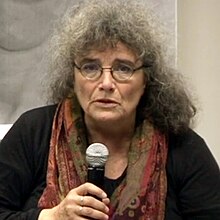Coline Serreau
Coline Serreau (born October 29, 1947 in Paris ) is a French filmmaker and writer .
Life and meaning
Coline Serreau was born in Paris in 1947 as the daughter of the writer Geneviève Serreau and the theater director Jean-Marie Serreau. She studied literature, music and theater studies as well as circus (trapeze) in her hometown. After training as an actor, she made her debut at the Theater du vieux Colombier in 1970 and took her first film role in Robert Enrico's Un peu, beaucoup, passionnement ; then she subsequently played in various roles at French venues, sometimes with permanent engagements .
Her début in front of a camera followed in 1971 in Robert Enrico's Un peu, beaucoup, passionnément… In 1973 she wrote her first screenplay for the film Errtum einer Liebesgeschichte , which was made into a film with her in the lead role in 1974 by director Jean-Louis Bertuccelli . In 1975 she made her directorial debut in the short film Les rendez-vous , staged for television, and two years later her first film, the documentary Mais qu'est ce qu'elles veulent? (1977), literally: “But what do you want?”, In which women of various origins were interviewed. The film caused a sensation because of the unusual frankness of the statements.
Coline Serreau's first feature film was Pourquoi pas? , which is entitled Why not! 1978 ran successfully in German art house cinemas. By telling the story of a love triangle between two men and a woman in a shared apartment on the outskirts of Paris in a tragicomic yet realistic manner, he was an early example of a film in which homosexual and bisexual relationships are not characterized as distant and flashy. Due to the constellation of the triangle as well as one of the main characters, Sami Frey , Why not! a reminiscence of Claude Sautet's masterpiece César and Rosalie from 1972, in which Frey appeared alongside Romy Schneider (Rosalie) and Yves Montand (César). In this film the men were still competing for the beautiful woman, but after Rosalie had lived together - one after the other - she freed herself from them to lead an independent life, and from then on César and David (Frey) lived together in a house in a suburb of Paris - but still without being homosexual. Both films, which were entirely committed to the free spirit of the 1970s, stood in the tradition of an even more famous, older triangular history of French cinema: Jules and Jim by director François Truffaut (1962).
After another cinema production, Coline Serreau returned to television in 1979, but made feature films for the cinema again in the 1980s. Her comedy Three Men and a Baby ( Trois hommes et un couffin ), which she wrote and directed, was an international success. The work was awarded three Césars in 1986 , including one in the “Best Film” category, and was nominated for both an Oscar and a Golden Globe as the best foreign-language film . The follow-up film Three more men, one more baby could not build on this success.
In 1986 Serreau's first play, Lapin Lapin ( Hare Hase ), premiered at the Theater de la ville (Paris) (directed by Benno Besson ). In the world premiere she played the role of mom. Years of fruitful collaboration followed with Besson, where he premiered her next pieces Le théâtre de verdure (1987) and Quisaitout et Grobêta (1993).
In 2005 Serreaus' pilgrim comedy Saint Jacques made another, also commercial, cinema success ... Pilgrims in French over the recently growing stream of pilgrims on the Way of St. James .
Filmography
- 1974: Mistake in a love story (On s'est trompé d'histoire d'amour) - book and actress, director: Jean-Louis Bertuccelli
- 1977: why not! (Pourquoi pas!) - Script and direction
- 1978: Mais qu'est ce qu'elles veulent? - Written and directed by
- 1982: Qu'est-ce qu'on attend pour être heureux! - Written and directed by
- 1985: Three men and a baby (Trois hommes et un couffin) - written and directed
- 1987: Three Men and a Baby (Three men and a baby) - as a template served Serreaus screenplay for Three Men and a Baby - Director: Leonard Nimoy
- 1989: Milk and Chocolate (Romuald et Juliette) - script and direction
- 1990: Three Men and a Little Lady - Serreau's script for Three Men and a Baby was used as a template - directed by Emile Ardolino
- 1992: La Crise - written and directed
- 1996: The green planet - visit from space (La belle verte) - book, director, actress, music
- 2001: Chaos - written and directed
- 2003: 18 years later (18 ans après) - script, direction and music
- 2005: Saint Jacques… Pilgrimage in French (Saint-Jacques… La mecque) - script and direction
- 2010: Good food bad food - Instructions for a better agriculture (Solutions locales pour un désordre global) - Script and direction
literature
- Colville, G. "On Coline Serreau's Mais qu'est ce qu'elles veulent? And the Problematics of Feminist Documentary," French Cinema , Nottingham French Studies, vol. 32, 1993, No.1, pp.84-89
Web links
- Coline Serreau in the Internet Movie Database (English)
| personal data | |
|---|---|
| SURNAME | Serreau, Coline |
| BRIEF DESCRIPTION | French filmmaker and writer |
| DATE OF BIRTH | October 29, 1947 |
| PLACE OF BIRTH | Paris |
